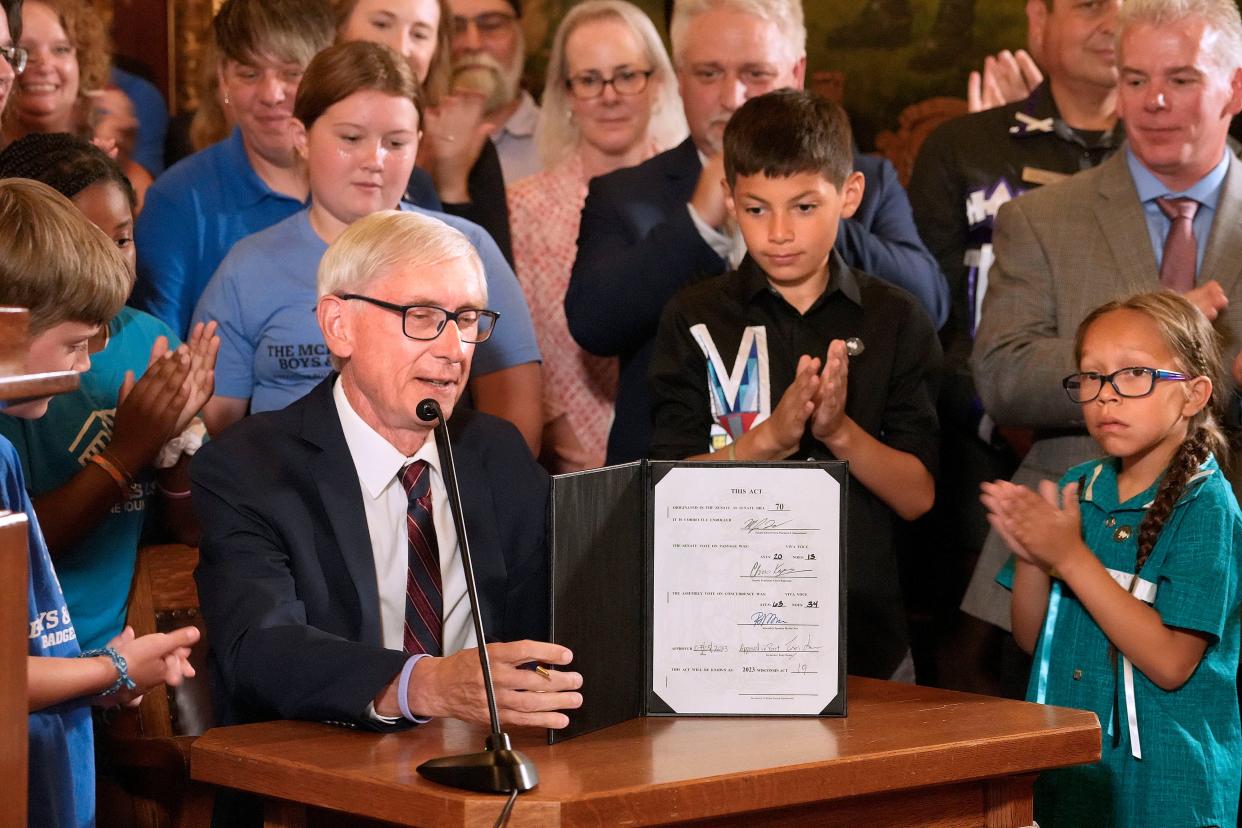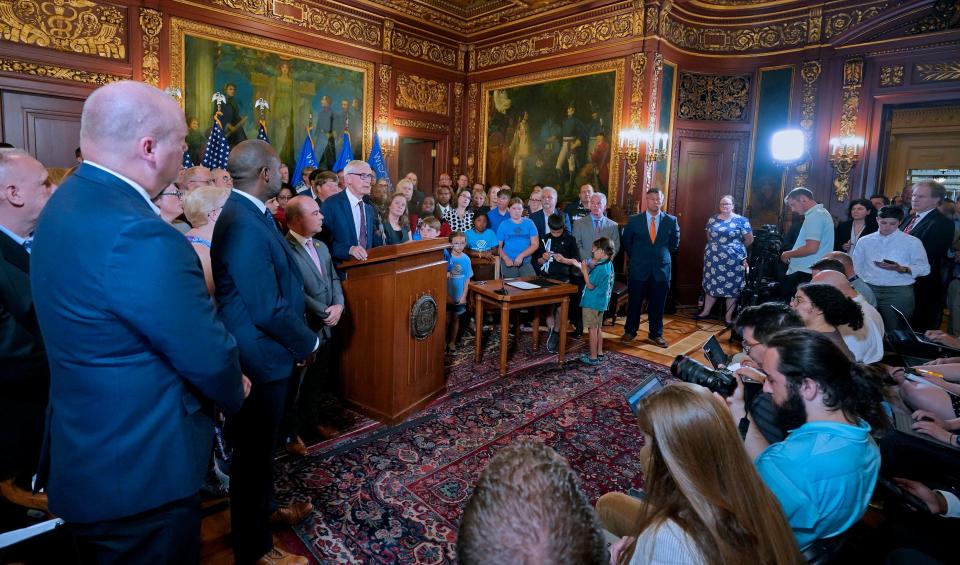Tony Evers uses veto powers to extend annual increases for public schools for the next four centuries

MADISON – Gov. Tony Evers, a former public school educator, used his broad partial veto authority this week to sign into law a new state budget that increases funding for public schools for the next four centuries.
The surprise move will ensure districts' state-imposed limits on how much revenue they are allowed to raise will be increased by $325 per student each year until 2425, creating a permanent annual stream of new revenue for public schools and potentially curbing a key debate between Democrats and Republicans during each state budget-writing cycle.
Evers told reporters at a press conference in the Wisconsin State Capitol on Wednesday his action would "provide school districts with predictable long-term increases for the foreseeable future."
Evers crafted the four-century school aid extension by striking a hyphen and a "20" from a reference to the 2024-25 school year. The increase of $325 per student is the highest single-year increase in revenue limits in state history.

The veto was one of more than four dozen the Democratic governor made to reshape the $99 billion two-year state budget Republicans passed last week. Among the vetoes was the majority of the centerpiece of Republican lawmakers' budget plan: a $3.5 billion tax cut that focused relief for the state's wealthiest residents.
Instead, the reshaped budget will provide $175 million in tax relief and won't condense the state's four income tax brackets into three as Republicans proposed, according to the governor.
Evers said last year he would not sign a budget that included tax relief for wealthy residents and GOP lawmakers crafted the budget in a way that would allow him to veto the changes to the top bracket to ensure the entire the budget would not be scrapped, according to Rep. Evan Goyke, the ranking Democratic member of the Legislature's budget-writing committee.
Even so, Republican lawmakers blasted Evers for the move ? calling the pair of vetoes to cut the income tax plan and to create permanent increases for schools an assault on taxpayers and going back on his campaign promise to enact a middle-class tax cut. Part of Evers' veto action includes scrapping reductions for residents earning between $36,840 and $405,550 each year.
“Legislative Republicans worked tirelessly over the last few months to block Governor Evers’ liberal tax and spending agenda. Unfortunately, because of his powerful veto authority, he reinstated some of it today," Assembly Speaker Robin Vos, R-Rochester, said in a statement.
“Vetoing tax cuts on the top two brackets provides hardly any tax relief for truly middle-class families. His decision also creates another economic disadvantage for Wisconsin, leaving our top bracket higher than most of our neighboring states, including Illinois."
Social media reacts: Ken Jennings says he wants to become Wisconsin's governor after seeing what Tony Evers did today
The Republican plan would have reduced the top tax rate of 7.65% to 6.5%, which amounts to a 15% reduction for the top earners in the state who earn as a married couple $405,550 or more annually. The second-highest rate, which covers married filers who earn between $36,840 and $405,550 annually, would have been reduced by about 17%, from 5.3% to 4.4%. Evers vetoed both changes.
He kept in place reductions for the third-highest tax rate which covers those who earn $36,840 and less as a couple. That rate would go from 4.65% to 4.4%, or a 5.4% reduction, and the bottom rate would slightly reduce from 3.54% to 3.5%.
Assembly Majority Leader Tyler August said the move "broke a deal" between Evers and GOP lawmakers on school funding as part of a broader agreement on a separate bill to boost funding for local government that was aimed at saving Milwaukee from entering a fiscal crisis.
"After months of good faith negotiations on major budget items, it is unacceptable that he went back on his word and broke our agreement," August said. "It will be difficult, if not impossible, to ever negotiate with this governor again in the future.”
Evers' spokeswoman Britt Cudaback said August "was never part of any conversation the governor had with Republican leaders."
"If he had been, he’d know that the governor upheld every part of the bipartisan compromise reached with the Speaker and the Majority Leader," Cudaback said in a tweet, referring to Vos and Senate Majority Leader Devin LeMahieu.
Dan Rossmiller, who represents the Wisconsin Association of School Boards, said the permanent annual funding increase was "certainly appreciated." But Rossmiller said the impact of additional funding could vary by district and worried the increase wasn't enough to meet or exceed the rate of inflation for some districts.
"I wish the amount would have been higher," Rossmiller said. "With inflation at 40-year highs, it's really important to be able to attract and retain teachers and staff, and to be able to pay the increased costs of everything in a school district's budget."
Evers vetoes elimination of 188 UW System jobs focused on DEI
Evers also vetoed a plan from Republican lawmakers to eliminate 188 positions within the University of Wisconsin System focused on diversity, equity and inclusion programs, but maintained the $32 million cut in funding that was paired with the staffing reduction. Republicans put $32 million into a fund UW officials may request money from as long as the GOP-controlled committee approves the officials' plans for its use.
The Republican National Convention, that will be held in Milwaukee next year, also could see less money coming from taxpayers under the governor's action Wednesday.
Evers' vetoed a $10 million grant for Visit Milwaukee, the city's tourism bureau, that Republicans included in the state budget without restrictions for how the money could be spent. Evers left in place $1 million for Visit Milwaukee and moved $9 million into the state Department of Tourism's budget for marketing.
The budget also sets aside $2.5 million from the Knowles-Nelson Stewardship Program for drilling new wells, facility maintenance, upgrades and renovations and new buildings at a number of fish hatcheries in Wisconsin. Evers vetoed the earmarks for specific projects, highlighting that the decision on what is funded by the program shouldn't be decided solely by the Legislature.
The veto will allow the DNR to access the funding in order to decide on facility upgrades.
Evers also used his veto power to expand the scope of a Department of Veterans Affairs study. Lawmakers' budget included a requirement for the agency to conduct a two-year study of the troubled King veterans home. With the governor's changes, the study will no longer be confined to King.
Republican legislative leaders did not immediately say whether they would try to override Evers' budget action. Republicans failed to achieve a veto-proof supermajority in the Assembly in the November election, so any veto override would require three Democrats to join all Republicans in an override vote. Republicans could also schedule a vote when a handful of Democrats are absent.
One seat remains vacant — the suburban Milwaukee seat formerly held by Republican Dan Knodl, who gave Republicans a supermajority in the Senate with his victory in a special election earlier this year.
“Clearly, now that he’s won re-election by taking credit for Republican ideas, it’s business as usual for Governor Evers, as he returns to his true liberal ideology," Vos said.

Evers also used his veto power to eliminate restrictions lawmakers intended to place on the state’s venture capital investment initiative, the Badger Fund of Funds.
The Fund of Funds is a public-private investment program that allows the state to invest in Wisconsin startups. Under the budget passed by the Legislature, the program would have received a $25 million investment from the state, but would have to repay it in its entirety. The program also would have been required to send 90% of the gross proceeds of that investment into the state’s general fund.
Evers removed those requirements, saying in his veto message that he objects to measures that would reduce the resources available for investment. Evers said he was concerned those limitations might detract from efforts to attract additional private co-investors.
“Allowing the program to retain and reinvest the funds will improve the state’s venture capital ecosystem and support increases in start-up funding across Wisconsin,” Evers wrote.
The program was launched with a $25 million investment from the state in 2013-14. Evers’ veto does not affect an existing requirement that 90% of the initial investment be sent to the state’s general fund.
Republicans spent two months writing the budget after scrapping Evers' original plan
The veto action comes after the Legislature's budget-writing committee spent two full months writing the two-year spending plan. The budget was crafted by the committee after Republicans who control the panel decided not to include more than 500 proposed funding items from Evers.
Items removed from the governor's proposed budget include the creation of a paid family leave program, expanding Medicaid, extending pandemic-era funds for childcare programs, legalizing marijuana, adding mental health programs in schools and several measures aimed at addressing PFAS contamination, though a historic $125 million plan to clean up PFAS contamination across the state is part of the budget.
Under the budget plan, Wisconsin schools would receive about $1 billion in additional revenue over the next two years alone through a mix of new funding and property tax increases as part of lawmakers' budget action and a separate agreement between Evers and GOP lawmakers on local government funding.
Lawmakers agreed to include in the state budget an additional $778.5 million in state funding while also allowing school districts to raise the rest through property tax increases. Included in the plan sent to Evers was $534.3 million more in general school aid and an increase of $650 per student in state-imposed limits on how much revenue schools are allowed to raise over the two years of the state budget. Evers' action raises general school aid and makes the latter increase permanent.
The percentage of special education costs covered by the state also would increase to 33.3% from 30% under current law.
The budget plan approved by the Assembly also approved pay raises for state workers and UW System employees. Wages will increase 4% this July and another 2% next July.
Employees in the state's prison system would also see a $33 per hour minimum rate, with increased pay progression rates and incentives for roles that are often empty.
Evers used his veto authority to increase flexibility in the distribution of funds for several aid programs. Although Republicans opted not to approve Evers’ proposal to spend $350 million on extending a pandemic-era childcare relief program, they did allocate $15 million for a revolving loan fund for childcare providers.
The governor used his veto authority to allow those funds to be distributed as grants rather than loans. Evers made a similar adjustment to funds for housing rehabilitation projects, allowing the Wisconsin Housing and Economic Development Authority to provide grants or forgivable loans to homeowners.
Evers also kept in place $2 million to help pay for costs associated with the Green Bay Packers hosting the National Football League draft in 2025.
Lawmakers also approved a 2% increase for transit funding in the budget Evers signed Wednesday. The increase came paired with a proposal to move funding for buses and other mass transit systems from the state’s transportation fund to the general purpose fund, the state’s largest pool of funding used for a wide array of government services.
Tyler Katzenberger and Laura Schulte of the Milwaukee Journal Sentinel contributed to this report.
Molly Beck and Jessie Opoien can be reached at [email protected] and [email protected].
THANK YOU: Subscribers' support makes this work possible. Help us share the knowledge by buying a gift subscription.
DOWNLOAD THE APP: Get the latest news, sports and more
This article originally appeared on Milwaukee Journal Sentinel: Tony Evers extends increases for public schools in perpetuity
Solve the daily Crossword

